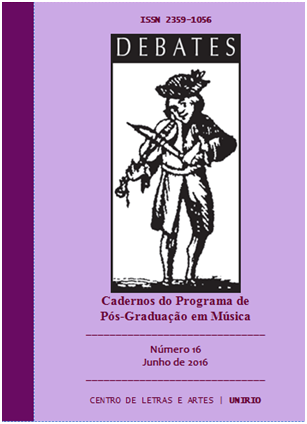O acorde de dominante e o trítono na obra de Alexander Scriabin, em particular nos três Estudos, op. 65 para piano
Resumen
Resumo: O acorde de dominante e o trítono foram recursos intensamente utilizados nas peças do pianista e compositor russo Alexander Nikolaievich Scriabin (1871-1915). Ao examinar a escrita do compositor verifica-se que o papel atribuído a esses recursos sofreu uma espécie de transmutação ao longo de sua produção musical. Os três Estudos, op. 65 (1911-12) para piano, produção da sua última fase, têm como harmonia exclusiva o acorde de dominante ou a sua redução ao intervalo característico do trítono. A presença constante dessa harmonia pode ser verificada também em peças de opus anteriores, de modo que a análise de seu uso no op. 65 deve estar sincronizada com obras criadas em períodos relativamente distantes no tempo. Examinada à luz da temporalidade, foram as tendências estéticas em diferentes épocas que diluíram e fizeram sofrer desgaste a tensão atribuída às sonoridades da dominante e do trítono. Scriabin, porém pleiteou para suas obras uma função esotérica que colocou em segundo plano razões puramente estéticas ou técnicas. Entretanto, a revalorização recente de suas obras tem focalizado mais os aspectos estéticos do que os esotéricos.
Palavras-chave: Scriabin; música para piano; acorde de dominante; trítono.
The dominant chord and the tritone in the work of Alexander Scriabin, particularly in the three studies, op. 65 for piano
Abstract: The dominant chord and the tritone resources were heavily used by the pianist and composer Alexander Nicolaievich Scriabin (1871-1915) in his compositions. By examining the composer's writing it appears that the role assigned to them suffered a kind of transmutation throughout his musical production. The three studies, op. 65 (1911-12) for piano, production of his final phase, used exclusively the harmony of the dominant chord or his reduction to its characteristic range, the tritone. This harmony also shows up in works created before, so that the analysis of its use in op. 65 must be synchronized with works composed in relatively distant periods in time. The tension attributed to the sounds of the dominant and the tritone diluted and eroded at certain times, in a phenomenon become evident when examining the op. 65 in the light of temporality. Esoteric function pled by Scriabin for his works put in the background purely aesthetic or technical reasons. However, the recent appreciation of his music has focused more on the aesthetic aspects than on the esoteric.
Keywords: Scriabin; piano music; dominant chord; tritone.


